pep小学五年级英语下册知识点整理
pep小学五年级英语下册知识点整理
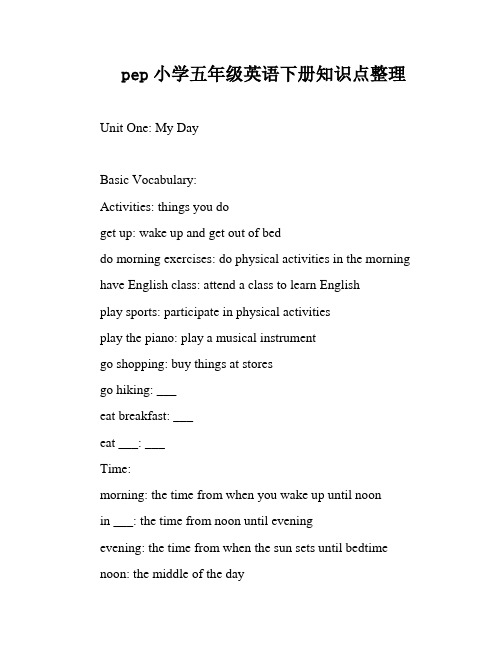
pep小学五年级英语下册知识点整理Unit One: My DayBasic Vocabulary:Activities: things you doget up: wake up and get out of beddo morning exercises: do physical activities in the morning have English class: attend a class to learn Englishplay sports: participate in physical activitiesplay the piano: play a musical instrumentgo shopping: buy things at storesgo hiking: ___eat breakfast: ___eat ___: ___Time:morning: the time from when you wake up until noonin ___: the time from noon until eveningevening: the time from when the sun sets until bedtime noon: the middle of the dayat night: during the nighttime6:00: a specific timeon Sunday: on the day of the week called Sundaywhen: ___Frequency Words:always: all the timeusually: most of the timeoften: ___sometimes: nallyin order of decreasing frequency)Basic ___ Structures:1.Asking about daily routines:When do you…。
PEP五年级下册英语知识点整理
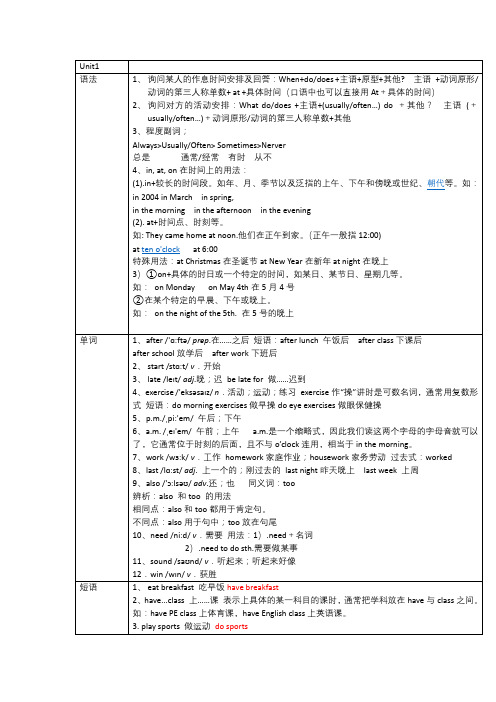
11、sound /saʊnd/v.听起来;听起来好像
12.win /wɪn/v.获胜
短语
1、eat breakfast吃早饭have breakfast
2、have...class上……课表示上具体的某一科目的课时,通常把学科放在have与class之间。如:have PE class上体育课,have English class上英语课。
on vacation度假同义词:holiday
4、lovely /lʌvli/adj.可爱的;美丽的
5、leaf /liːf/n.叶子复数:把leaf中的f变v,再加es,即leaves。
6、fall /fɔːl/v.落下n.秋天在美式英语中多用fall表示“秋天”,而英式英语
fall behind落后fall down落下
2、spring /sprɪŋ/n.春天在某个季节用介词in
summer /'sʌmə/n.夏天、跌势
autumn /'ɔːtəm/n.秋天in autumn在秋天early autumn初秋同义词:fall
winter /'wɪntə(r)/n.冬天
3.vacation /və'keɪʃn/n.假期summer vacation暑假winter vacation寒假
2、询问喜欢某个季节的原因:Why?/ Why do/does主语like、、、best?
Because….
because /bɪ'kɔːz/conj.因为用来连接表示因果关系的句子,后面跟表示原因的句子。
because of因为;由于+名词
ቤተ መጻሕፍቲ ባይዱ单词
PEP小学英语五年级下册各单元知识重点总结
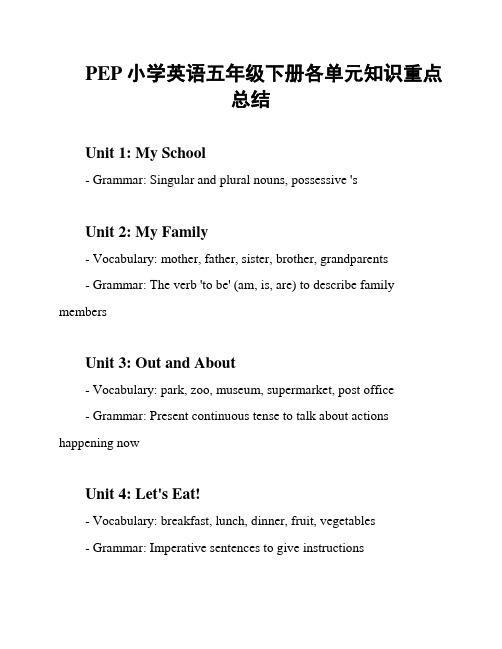
PEP小学英语五年级下册各单元知识重点总结Unit 1: My School- Grammar: Singular and plural nouns, possessive 'sUnit 2: My Family- Vocabulary: mother, father, sister, brother, grandparents- Grammar: The verb 'to be' (am, is, are) to describe family membersUnit 3: Out and About- Vocabulary: park, zoo, museum, supermarket, post office- Grammar: Present continuous tense to talk about actions happening nowUnit 4: Let's Eat!- Vocabulary: breakfast, lunch, dinner, fruit, vegetables- Grammar: Imperative sentences to give instructionsUnit 5: At the Farm- Vocabulary: farmer, barn, cow, pig, chicken- Grammar: There is/There are to talk about existenceUnit 6: Our Town- Vocabulary: street, hospital, police station, fire station, city- Grammar: Prepositions of place (in, on, under, behind, next to)Unit 7: Weather Report- Vocabulary: sunny, cloudy, rainy, snowy, windy- Grammar: Adjectives to describe weatherUnit 8: Fun with Friends- Vocabulary: play, sing, dance, swim, draw- Grammar: Simple present tense to talk about daily activitiesUnit 9: In the Ocean- Vocabulary: fish, dolphin, shark, octopus, seahorse- Grammar: Wh- questions using 'What' and 'Where'Unit 10: Happy Holidays- Vocabulary: Christmas, Easter, Halloween, New Year's Day, Thanksgiving- Grammar: Use of can for ability。
新人教版PEP 【小学五年级英语下册】 单元知识点 归纳总结

新人教版PEP 【小学五年级英语下册】单元知识点归纳总结Unit 1 My DayIn this unit。
we learn some core vocabulary words。
phrases。
and XXX.Core Vocabulary:1.Verbs: take (studying)。
go to (class)2.Nouns: dancing。
exercise。
sports3.Phrases: do morning exercises。
eat breakfast。
play sports。
eat dinner。
go for a walk。
go shopping。
clean my room。
take a dancing class。
have a classXXX Vocabulary:1.Verbs: start。
shop。
work。
need。
live。
win。
sound2.Nouns: Spain。
play。
letter。
island。
cave3.ns: after4.XXX: when。
XXX。
a.m。
p.m。
why。
last。
also。
busy5.nal Vocabulary: frequency adverbs (always。
usually。
sometimes)Phrases:watch TV。
eat lunch。
go to bed。
go swimming。
go home。
go to schoolCore Sentence Structure:When do you do morning exercises?" "At 7 o'clock."XXX phrase is "good job" to praise XXX.Which season do you like best。
I like winter best。
This sentence means "which one do you like the most" and "like。
【口袋书】人教版PEP五年级下册英语 基础知识汇总

人教版PEP五年级下册基础知识汇总Unit 1 My day.重点单词:[四会]dancing 跳舞;舞蹈exercise 活动;运动take 学习;上(课)[三会]after 在(时间)后start 开始usually 通常地;惯常地Spain 西班牙late 晚;迟a.m.午前;上午p.m.午后;下午why 为什么shop 去买东西;购物work 工作last 上一个的;刚过去的sound 听起来好像also 还;也busy 忙的need 需要play 戏剧;剧本letter 信live 居住island 岛always 总是;一直cave 山洞;洞穴win 获胜重点短语:eat breakfast 吃早饭have … class 上…课play sports 进行体育运动do morning exercises 做早操eat dinner 吃晚饭clean my room 打扫我的房间go for a walk 散步go shopping 去买东西;购物take a dancing class 上舞蹈课go swimming 去游泳start class 开始上课last night 昨天晚上after lunch 午饭以后a lot of fun 许多乐趣live on an island 住在一座岛上be good at sports 擅长体育运动字母组合cl 发/kl/ 音:clean 打扫clock 钟class 课;班级clever 聪明的clock 钟字母组合pl 发/pl/ 音:plate 盘子;碟子eggplant 茄子please 请play 玩耍;戏剧重点句型:1.询问别人什么时候做某事的问句及回答:-- When do/does + 主语+ 动词(短语)原形(+ 其他)?-- 主语(+ 频度副词)+ 动词(短语)原形/ 第三人稀单数形式+ at + 具体时间/ At + 具体时间.-- When do you get up? 你什么时候起床?-- I get up at 5 o'clock. 我5点起床。
人教版PEP小学英语五年级下册知识点汇总(最新)
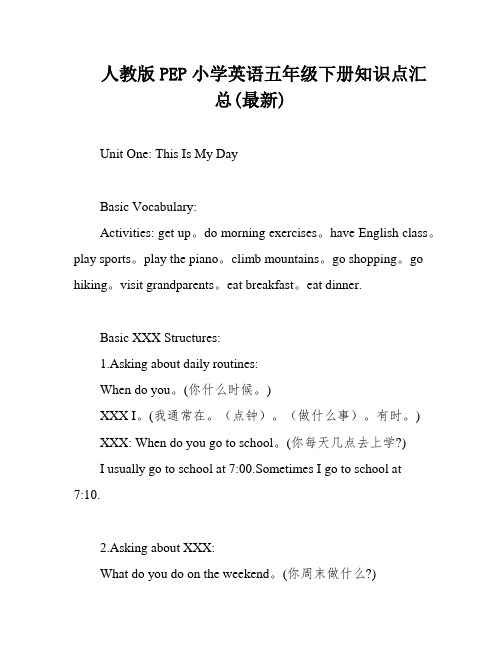
人教版PEP小学英语五年级下册知识点汇总(最新)Unit One: This Is My DayBasic Vocabulary:Activities: get up。
do morning exercises。
have English class。
play sports。
play the piano。
climb mountains。
go shopping。
go hiking。
visit grandparents。
eat breakfast。
eat dinner.Basic XXX Structures:1.Asking about daily routines:When do you。
(你什么时候。
)XXX I。
(我通常在。
(点钟)。
(做什么事)。
有时。
)XXX: When do you go to school。
(你每天几点去上学?)I usually go to school at 7:00.Sometimes I go to school at7:10.2.Asking about XXX:What do you do on the weekend。
(你周末做什么?)XXX I。
(我通常/经常。
有时。
)XXX: What do you do on the weekend?I often play XXX I go shopping with my mom.3.Introducing one's own habits:Every weekend。
I go hiking。
(我每个周末远足。
)Every day。
I do my homework at 8:00 in the evening。
(我每天晚上8点做作业。
)4.Asking XXX:What do you do。
(你是干什么的?)Time:morning。
afternoon。
evening。
noon。
at night。
6:00.on Sunday。
PEP小学五年级英语下册知识清单

PEP小学五年级英语下册Unit 1 My day 知识清单【句型/语法知识点】一. 频度副词(放主语之后)。
always总是(100%); usually通常(80%); often 经常(60%);sometimes有时(30%);never从不(0%)二. 重点句型。
1. 询问别人什么时候做某事的句型及回答。
句型结构:问:When +助动词do/does + 主语(非三单/三单)+ 动原+ 其他?答:①主语(非三单)+(频度副词)+动原+ at + 时间点.例:问:When do you go to bed?答:I go to bed at 9:00p.m答:②主语(三单)+(频度副词)+动词三单形式(动词s/es)+ at + 时间点.例:问:When does Amy go to bed?答:She goes to bed at 9:00 p.m.2. 询问别人周末做什么的句型及回答。
句型结构:问:What +助动词do/does + 主语(非三单/三单)+ do + on the weekend?答:①主语(非三单)+(频度副词)+动原.例:问:What do you do on the weekend?答:I usually read books.答:②主语(三单)+(频度副词)+动词三单形式(即动词s/es).例:问:What does Amy do on the weekend?答:She often goes shopping with her mother .三.句型转换:1.肯定句↔一般疑问句:I usually get up at 6:00. ↔ Do you usually get up at 6:00?肯定回答:Yes, I do. 否定回答:No, I don’t.(第三人称时) He eats dinner at 6:00p.m. ↔ Does he eat dinner at 6:00p.m.?肯定回答:Yes, he does. 否定回答:No, he doesn’t.2.肯定句↔否定句:I like playing the piano. ↔ I don’t like playin g the piano.I can play the piano. ↔ I can’t play the piano.3.划线提问:⑴ I often go shopping on the weekend. → When do you go shopping ?⑵ I often go shopping on the weekend. → What do you do on the weekend?⑶ I go to school at 7:00. → When do you go to school?四. 语音:cl /kl/ clean clock class clever pl /pl / plate eggplant please playPEP小学五年级英语下册Unit 2 My favourite season 知识清单【四会单词】【重点句型】【句型/语法知识点】一. 重点句型1. 询问别人天气怎么样的句型及回答。
新人教版PEP五年级英语下册各单元知识点总结
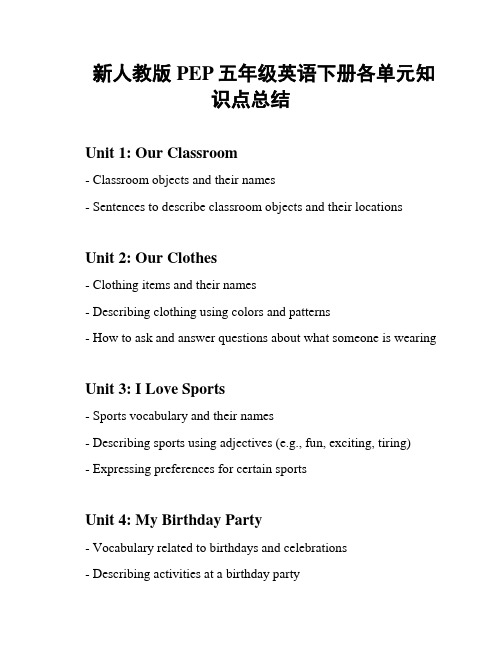
新人教版PEP五年级英语下册各单元知识点总结Unit 1: Our Classroom- Classroom objects and their names- Sentences to describe classroom objects and their locationsUnit 2: Our Clothes- Clothing items and their names- Describing clothing using colors and patterns- How to ask and answer questions about what someone is wearingUnit 3: I Love Sports- Sports vocabulary and their names- Describing sports using adjectives (e.g., fun, exciting, tiring)- Expressing preferences for certain sportsUnit 4: My Birthday Party- Vocabulary related to birthdays and celebrations- Describing activities at a birthday party- Expressing likes and dislikes about different party elementsUnit 5: At the Farm- Vocabulary related to farm animals and their names- Describing farm animals using adjectives (e.g., big, small, noisy) - Describing activities at a farm (e.g., feeding animals, milking cows)Unit 6: A Fun Day Out- Vocabulary related to amusement park rides and activities- Describing activities and experiences at an amusement park- Expressing likes and dislikes about different rides and activitiesUnit 7: A Friendly Letter- Vocabulary related to writing a letter (e.g., greeting, closing, signature)- Structure of a friendly letter- Writing a letter to a friend, describing personal experiences or activitiesUnit 8: Our Pets- Vocabulary related to pets and their names- Describing pets using adjectives (e.g., cute, friendly, playful)- Talking about responsibilities and caring for petsUnit 9: Our Earth- Vocabulary related to the environment and nature- Describing different natural elements (e.g., mountains, rivers, plants)- Expressing concerns and suggesting actions to protect the environmentUnit 10: Fun with Art- Vocabulary related to art and artistic activities- Describing different art forms (e.g., drawing, painting, sculpting) - Talking about personal preferences for different art activitiesUnit 11: Let's Travel- Vocabulary related to travel and transportation- Describing different modes of transportation (e.g., car, train, airplane)- Talking about travel experiences and preferences for different destinationsUnit 12: Healthy Habits- Vocabulary related to health and healthy habits- Describing different healthy habits (e.g., exercise, balanced diet, enough sleep)- Talking about personal choices and habits for a healthy lifestyle。
(完整)PEP小学英语五年级下册各单元知识重点归纳-推荐文档

PEP五年级下册各单元知识重点Unit 1 This Is My Day我会背:do morning exercises晨练eat breakfast吃早饭have english class上英语课play sports进行体育运动eat dinner吃晚饭when什么时候evening夜晚;晚上get up起床at在……点钟usually通常;一般noon中午climb mountains爬山go shopping购物;买东西play the piano弹钢琴visit grandparents看望祖父母go hiking去远足weekend周末often经常sometimes有时候话题: 日常生活1. When do you do morning exercises? 你什么时候做早操?.usuall.d.mornin.exercise.a.8:00......我经常八点钟做早操。
(.usuall.ge.u.a.12:0.noo........我经常在中午十二点起床。
)2. When do you eat dinner ? 你什么时候吃晚餐?.ea.dinne.a.7:0.i.th.evening........我在晚上七点钟吃晚餐。
3.Wha.d.yo.d.o.th.weeken......... 你周末做什么?.usuall.clim.mountains. 我通常去爬山. .ofte.pla.sport..我经常经行体育锻炼。
Sometime..pla.th.pian..有时候我弹钢琴。
Unit 2 My Favourite Season我会背:spring春天summer夏天fall秋天winter冬天season季节which哪一个best最;极swim游泳fly kites放风筝skate滑冰make a snowman堆雪人plant trees种树why为什么because因为sleep睡觉favourite 最喜爱的话题: 季节1. Which season do you like best ? I like spring best.(Spring.)你最喜欢是什么季节?我最喜欢春季。
(完整版)新版PEP五年级下册知识点总结,推荐文档
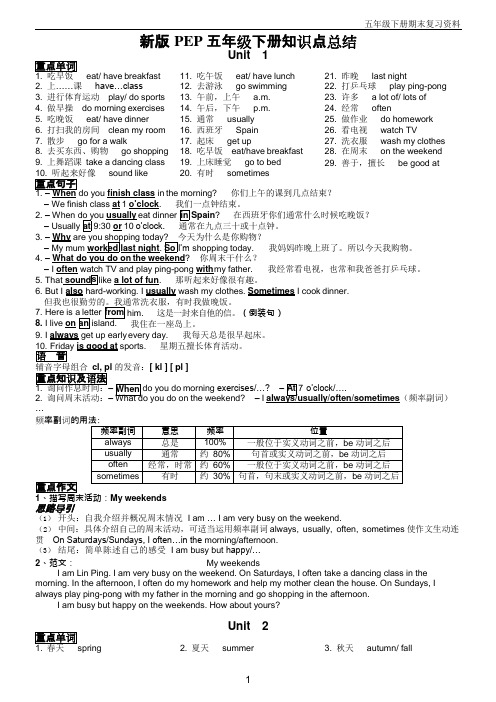
in at When 新版 PEP 五年级下册知识点总结Unit 11. 吃早饭 eat/ have breakfast2. 上……课 have…class3. 进行体育运动 play/ do sports4. 做早操 do morning exercises5. 吃晚饭 eat/ have dinner6. 打扫我的房间 clean my room7. 散步 go for a walk8. 去买东西、购物 go shopping 9. 上舞蹈课 take a dancing class 10. 听起来好像 sound like11. 吃午饭 eat/ have lunch 12. 去游泳 go swimming 13. 午前,上午 a.m. 14. 午后,下午 p.m. 15. 通常 usually 16. 西班牙 Spain 17. 起床 get up18. 吃早饭 eat/have breakfast 19. 上床睡觉 go to bed 20. 有时 sometimes21. 昨晚 last night22. 打乒乓球 play ping-pong 23. 许多 a lot of/ lots of 24. 经常 often25. 做作业 do homework 26. 看电视 watch TV27. 洗衣服 wash my clothes 28. 在周末 on the weekend 29. 善于,擅长 be good at1. – When do you finish class in the morning? 你们上午的课到几点结束? – We finish class at 1 o’clock . 我们一点钟结束。
2. – When do you usually eat dinner Spain ? 在西班牙你们通常什么时候吃晚饭? – Usually 9:30 or 10 o’clock. 通常在九点三十或十点钟。
(完整版)人教版PEP五年级下册英语知识点复习总结
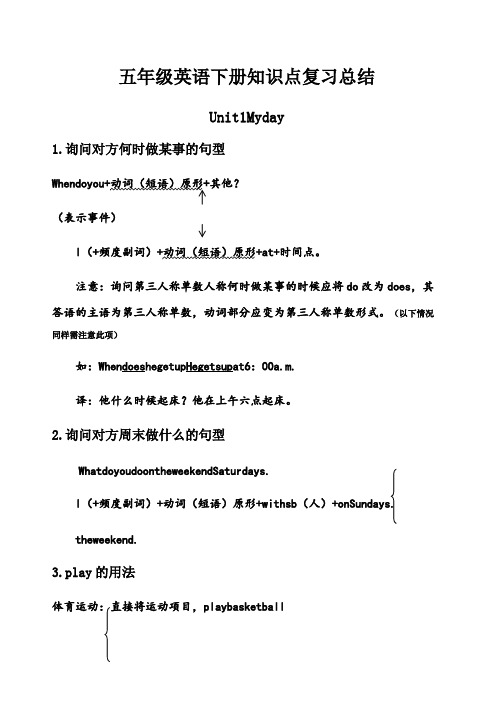
五年级英语下册知识点复习总结
Unit1Myday
1.询问对方何时做某事的句型
Whendoyou+动词(短语)原形+其他? (表示事件)
I(+频度副词)+动词(短语)原形+at+时间点。 注意:询问第三人称单数人称何时做某事的时候应将 do 改为 does,其 答语的主语为第三人称单数,动词部分应变为第三人称单数形式。(以下情况
同样需注意此项)
如:WhendoeshegetupHegetsupat6:00a.m. 译:他什么时候起床?他在上午六点起床。
2.询问对方周末做什么的句型
WhatdoyoudoontheweekendSaturdays. I(+频度副词)+动词(短语)原形+withsb(人)+onSundays. theweekend.
(2)在基数词后加 th:除去 first,second,third,其他基数词变序数词一般 直接在其后加 th。注意 five 与 twelve 要先把 ve 变 f,再加 th;eight 直接加 h;nine 去 e 再加 th。
(3)整十序数词以 ieth 结尾:整十位的序数词先将十位整数词尾的 y 变为 i, 再加 eth。如:twenty-twentieth。
The
注意:play-plays 因为 a 是元音 3)以 ch,sh,s,x 或 o 结尾的动词,在后面加-es; 例如 teach-teacheswash-washesdo-doesgo-goesfix-fixes
4)不规则的; 例如 have-has
5.by 的用法
五年级pep下英语知识点
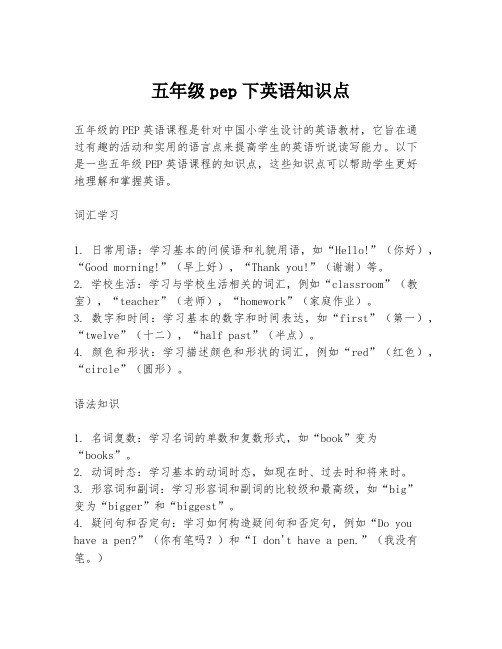
五年级pep下英语知识点五年级的PEP英语课程是针对中国小学生设计的英语教材,它旨在通过有趣的活动和实用的语言点来提高学生的英语听说读写能力。
以下是一些五年级PEP英语课程的知识点,这些知识点可以帮助学生更好地理解和掌握英语。
词汇学习1. 日常用语:学习基本的问候语和礼貌用语,如“Hello!”(你好),“Good morning!”(早上好),“Thank you!”(谢谢)等。
2. 学校生活:学习与学校生活相关的词汇,例如“classroom”(教室),“teacher”(老师),“homework”(家庭作业)。
3. 数字和时间:学习基本的数字和时间表达,如“first”(第一),“twelve”(十二),“half past”(半点)。
4. 颜色和形状:学习描述颜色和形状的词汇,例如“red”(红色),“circle”(圆形)。
语法知识1. 名词复数:学习名词的单数和复数形式,如“book”变为“books”。
2. 动词时态:学习基本的动词时态,如现在时、过去时和将来时。
3. 形容词和副词:学习形容词和副词的比较级和最高级,如“big”变为“bigger”和“biggest”。
4. 疑问句和否定句:学习如何构造疑问句和否定句,例如“Do you have a pen?”(你有笔吗?)和“I don't have a pen.”(我没有笔。
)听力和口语练习1. 听力理解:通过听英语故事和对话,提高理解能力。
2. 角色扮演:通过模拟不同的角色和情景,练习口语表达。
3. 日常对话:练习在日常生活中使用英语进行交流,如购物、问路等。
阅读理解1. 简单故事:阅读并理解简单的英语故事,学习故事的情节和角色。
2. 信息提取:从阅读材料中提取关键信息,回答相关问题。
写作技能1. 日记和信件:学习写日记和信件,表达个人感受和想法。
2. 描述性写作:练习描述人、地点或事件,使用形容词和副词。
文化意识1. 节日和习俗:了解不同文化中的节日和习俗,学习相关的英语表达。
(完整版)人教版PEP五年级英语下册各单元知识点
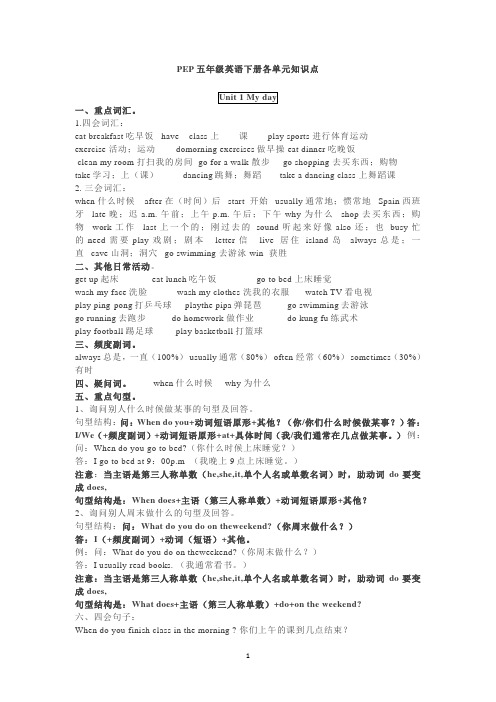
PEP五年级英语下册各单元知识点Unit 1 My day一、重点词汇。
1.四会词汇:eat breakfast吃早饭 have···class 上······课 play sports 进行体育运动exercise 活动;运动 domorning exercises做早操 eat dinner吃晚饭clean my room 打扫我的房间 go for a walk 散步 go shopping 去买东西;购物take学习;上(课) dancing跳舞;舞蹈 take a dancing class 上舞蹈课2. 三会词汇:when什么时候after 在(时间)后start 开始usually 通常地;惯常地Spain 西班牙late 晚;迟 a.m. 午前;上午 p.m. 午后;下午 why 为什么shop 去买东西;购物work 工作last 上一个的;刚过去的sound 听起来好像 also 还;也 busy 忙的 need 需要 play 戏剧;剧本letter 信live 居住island 岛always 总是;一直cave 山洞;洞穴go swimming 去游泳 win 获胜二、其他日常活动。
get up起床 eat lunch吃午饭 go to bed 上床睡觉wash my face洗脸 wash my clothes 洗我的衣服 watch TV看电视play ping-pong打乒乓球 playthe pipa弹琵琶 go swimming去游泳go running去跑步 do homework 做作业 do kung fu练武术play football踢足球 play basketball打篮球三、频度副词。
always总是,一直(100%) usually通常(80%) often 经常(60%) sometimes(30%)有时四、疑问词。
pep五年级下册英语知识点归纳总结

pep五年级下册英语知识点归纳总结PEP五年级下册是小学生学习英语的重要阶段,其中包含了许多重要的知识点。
本文将对这些知识点进行归纳总结,以便同学们更好地复习和掌握。
一、单词和短语1. 交通工具(Transportation)在五年级下册的英语学习中,我们学习了许多不同的交通工具,如car(汽车)、bus(公交车)、train(火车)、bike(自行车)等。
同学们需要掌握这些交通工具的拼写和意思。
2. 食物和饮品(Food and Drinks)学习英语的过程中,我们还需要掌握各种常见的食物和饮品的表达,如apple(苹果)、milk(牛奶)、rice(米饭)等。
同时,同学们还要学会用英语进行订餐和购物。
3. 数字和时间(Numbers and Time)数字和时间是英语学习中非常重要的一部分。
同学们需要掌握1-100的数字表达,并能够用英语来表达日期和时间。
4. 季节和天气(Seasons and Weather)我们也需要学习用英语表达不同的季节和天气,如spring(春天)、sunny(晴天)、rainy(多雨的)等。
二、语法知识1. 时态(Tenses)在五年级下册的学习中,我们学习了一些基本的时态,如一般现在时、一般过去时和将来时。
同学们需要掌握这些时态的用法和构造方式。
2. 句子结构(Sentence Structure)同学们还需要了解和掌握一些基本的句子结构,如肯定句、否定句和疑问句。
同时,还需要学会使用一些基本的句型,如There is/are...(有...)、I like...(我喜欢...)等。
3. 名词(Nouns)学习英语的过程中,同学们还需要了解和运用各种不同类型的名词,如可数名词和不可数名词,单数形式和复数形式等。
三、阅读理解1. 阅读技巧(Reading Skills)在五年级下册,我们开始进行一些简单的阅读理解训练。
同学们需要学会通过阅读文章来获取信息,并回答相关的问题。
人教版PEP五年级英语下册各单元语法点

人教版PEP五年级英语下册各单元语法点Unit 1: What Does She Do?- 一般现在时:用于描述日常活动或惯。
主语为第三人称单数时,动词加-s或-es。
- 观察寻找规律:第三人称单数的动词加-s或-es。
- Be动词+动词-ing:用于描述正在进行的动作。
主语为第三人称单数时,be动词用is。
- 一般现在时的否定句:在动词前面加don't/doesn't。
- 一般现在时的疑问句:将do/does置于主语之前。
Unit 2: Can You Run?- Can的用法:用于表示能力和询问对方是否能够做某事。
- Can的否定形式:在can后面加not或缩略形式can't。
- Can的疑问形式:将can置于句首。
Unit 3: What Are They Doing?- 现在进行时:用于描述正在进行的动作。
动词加-ing。
- 现在进行时的否定句:在be动词后面加not。
- 现在进行时的疑问句:将be动词置于句首。
Unit 4: I'm Sitting at the Front.- 介词短语表示地点:用于描述人或物所在的位置。
- 介词on、in、under、behind、in front of、next to等的用法。
Unit 5: What Are You Going to Do?- be going to的用法:表示将来要做的事情。
- be going to的否定形式:在be动词后面加not。
- be going to的疑问形式:将be动词置于句首。
Unit 6: It's Raining!- 祈使句:用于表示请求、命令或建议。
动词原形作谓语。
- 祈使句的否定形式:在动词前面加don't。
- 祈使句的疑问形式:用Do开头。
Unit 7: How Often Do You Exercise?- 表示频率的副词:用于描述动作发生的频率。
- always, usually, often, sometimes, hardly ever, never等的用法。
PEP五年级英语下册知识点

PEP五年级英语下册知识点anuar一月 Februar二月 March三月 April四月 Ma五月 une 六月 ul七月 August 八月 Septeber 九月 Octber十月Nveber 十一月 Deceber十二月注意:1、月份的首字母一定要大写。
2、Ma没有缩写形式,Septeber的缩写形式是“Sept”,其他月份单词的缩写形式都是有单词的前三个字母加“”构成。
3、月份的缩写形式不用在句子中,只能单独使用。
4、表示“在几月”时,要在月份单词前面加介词in。
New ear’s Da元旦(1.1) Tree Planting Da 植树节(3.12) Easter 复活节April Fl’s Da愚人节(4.1) Ma Da 劳动节(5.1) Mther’s Da母亲节(xx.5.10)Children’s Da 儿童节(6.1) Father’s Da父亲节(8.8) Teacher’s Da教师节(9.10)Natinal Da国庆节(10.1) Mid-Autun Da 中秋节(农历八月十五)Thansgiving Da 感恩节(11月第4个周四) Christas圣诞节(12.25)suer vacatin暑假 winter vacatin寒假sprts eet 运动会 Easter part 复活节聚会 schl trip 学校旅行Chinese test 语文测试 singing test歌咏比赛 birthda part生日聚会1、in后面+上午/下午/晚上/月份/季节/年份。
如:in the rning, in April, in winter, in xx.2、n的后面+详细的某一天。
如:n Mnda, n April 3rd, n Frida rning.3、at后面+详细的时间点或与其他词构成固定搭配。
如:at six ’clc, at 12:30,at nn.1、问答某个活动或节日在几月份的句型及答复。
PEP小学五年级下册英语知识点总结-全册(最新最全)

PEP小学五年级下册英语知识点总结-全册(最新最全)PEP小学五年级下册英语知识点总结全册Unit 1: Daily RoutinesIn this unit。
we learn some main words and XXX。
Some of the main words are: do morning exercises。
eat breakfast。
have English class。
play sports。
eat dinner。
climb mountains。
go shopping。
play the piano。
visit grandparents。
and go hiking。
For example。
when we want to ask someone when they eat dinner。
we can say "When do you eat dinner?" and the answer can be "I eat dinner at 7:00 in the evening." Similarly。
we can ask "When do you get up?" and the answer can be "I usually get up at 12:00 at noon." We can also use some synonyms like have breakfast instead of eat breakfast。
have lunch instead of eat lunch。
and have dinner instead of eat dinner。
We can also use do sports instead of play sports。
and often instead of usually.Unit 2: Seasons and ActivitiesIn this unit。
PEP小学英语五年级下册各单元要点总结
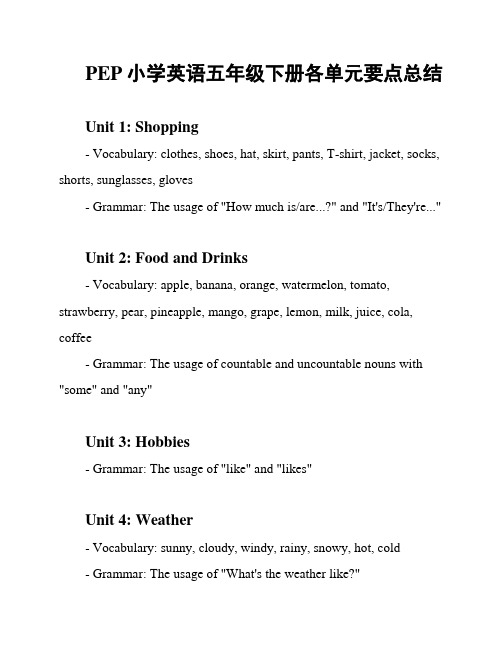
PEP小学英语五年级下册各单元要点总结Unit 1: Shopping- Vocabulary: clothes, shoes, hat, skirt, pants, T-shirt, jacket, socks, shorts, sunglasses, gloves- Grammar: The usage of "How much is/are...?" and "It's/They're..."Unit 2: Food and Drinks- Vocabulary: apple, banana, orange, watermelon, tomato, strawberry, pear, pineapple, mango, grape, lemon, milk, juice, cola, coffee- Grammar: The usage of countable and uncountable nouns with "some" and "any"Unit 3: Hobbies- Grammar: The usage of "like" and "likes"Unit 4: Weather- Vocabulary: sunny, cloudy, windy, rainy, snowy, hot, cold- Grammar: The usage of "What's the weather like?"Unit 5: Classroom- Vocabulary: desk, chair, blackboard, eraser, pencil, ruler, book, pen, bag, sharpener, glue, scissors- Grammar: The usage of prepositions "on", "in", and "under"Unit 6: Daily Routines- Vocabulary: get up, have breakfast, brush teeth, go to school, have lunch, do homework, have dinner, take a bath, go to bed- Grammar: The usage of present simple tense with daily routinesUnit 7: Jobs- Vocabulary: doctor, teacher, driver, police officer, firefighter, chef, engineer, artist, musician, journalist, scientist, astronaut- Grammar: The construction "What does he/she do?" and the usage of adjectives to describe jobsUnit 8: Animals- Vocabulary: dog, cat, bird, fish, rabbit, monkey, tiger, lion, elephant, panda, giraffe, snake, kangaroo- Grammar: The usage of "Can" to talk about abilitiesUnit 9: Festivals- Vocabulary: Spring Festival, Christmas, Thanksgiving, Easter, Halloween, Lantern Festival, Dragon Boat Festival, Mid-Autumn Festival, National Day- Grammar: The usage of "When is...?" and the construction "I like... because..."Unit 10: My City- Vocabulary: park, supermarket, hospital, school, post office, bank, library, restaurant, cinema, zoo, museum, airport, train station, subway - Grammar: The usage of prepositions "near", "next to", and "between"以上是PEP小学英语五年级下册各单元的要点总结。
- 1、下载文档前请自行甄别文档内容的完整性,平台不提供额外的编辑、内容补充、找答案等附加服务。
- 2、"仅部分预览"的文档,不可在线预览部分如存在完整性等问题,可反馈申请退款(可完整预览的文档不适用该条件!)。
- 3、如文档侵犯您的权益,请联系客服反馈,我们会尽快为您处理(人工客服工作时间:9:00-18:30)。
Unit One This Is My Day基本词汇:基本句型:1. 询问生活规律:---- When do you ……?你什么时候……?---- I usually… at … Sometimes I….我通常在…(点钟)…(做什么事)。
有时…E.g. --- When do you go to school ? 你每天几点去上学?--- I usually go to school at 7:00. Sometimes I go to school at 7:10.2. 询问生活习惯:--- What do you do on the weekend? 你周末做什么?--- I usually / often ….. Sometimes I …..E.g. --- What do you do on the week?--- I often play football. Sometimes I go shopping with my mom.3. 介绍自己的生活习惯:Every weekend I go hiking. 我每个周末远足。
Every day I do my homework at 8:00 in the evening. 我每天晚上8点做作业。
4. 询问职业:--- What do you do? 你是干什么的?--- I am a doctor / nurse / policeman….5. Thank you for telling me about your day! 谢谢你告诉我你的一天。
6. Let’s …. 让我们….(let’s = let us )Let’s go hiking together next Sunday. 下周我们一起去远足吧。
句型转换:1.肯定句↔一般疑问句:I usually get up at 6:00. ↔Do you usually get up at 6:00?肯定回答:Yes, I do. 否定回答:No, I don’t.(第三人称时) He eats dinner at 6:00p.m.↔Does he eat dinner at 6:00p.m.?2.肯定句↔否定句:I like playing the piano.↔ I don’t like playing the piano.I can play the piano. ↔ I can’t play the piano.3.划线提问:⑴I often go shopping on the weekend. →When do you go shopping ?⑵I often go shopping on the weekend. →What do you do on the weekend?⑶I am a student. →What do you do?⑷I go to school at 7:00. →When do you go to school?知识延伸:⑴同义词:play sports = do sportseat breakfast/ lunch/ dinner = have breakfast/ lunch/ dinner⑵同义句:What do you do? = What are you? 你是干什么的?⑶一般将来时:(be going to)The weather report says it is going to rain tomorrow. 天气预报说明天将要下雨。
作文:My dayHello,my name is Sarah. I am a primary school student. I usually get up at 6:30 a.m. Then I eat breakfast and go to school at 7:00a.m. Every day I have lunch at 12:00 noon. At 5:10p.m, I go home, and then I do my homework. I eat dinner with my parents and watch TV. I go to bed at 9:00p.m. This is my day. What about you?My name is Anna. Today is sunny. I get up at 6:00. Then I eat breakfast and go to school.I have four subjects. One Chinese class, one math class, one English class and one P.E. class.At noon we have lunch at school. Afternoon, we have two math lessons and one music lesson.Math is too difficult. Then I go home and do my homework, next I have dinner with my parents and wat ch TV. I go to bed at nine o’clock.Unit Two My Favourite Season基本词汇:基本句型:1. 询问喜欢哪个季节:⑴--- Which season do you like best? 你最喜欢哪个季节?--- I like +季节+ best. (例:I like spring∕summer∕fall∕winter best)--- 或:I like summer, because I can swim in the sea.⑵--- What is your favourite season? 你最喜爱的季节是什么?--- Spring∕summer∕fall∕winter is my favourite season.2. 询问天气:--- What is the weather like in fall in Beijing?北京秋天的天气是怎么样的?--- It is sunny and cool.3. 询问理由:--- Why do you like winter best?为什么你最喜欢冬天?--- Because I can play with snow and make a snowman.4. 询问想要做什么--- What would you like to do?--- I’d like to climb∕play sports……( I’d = I would )5. 询问具体季节--- What season is it in March in Beijing? 北京的三月份是什么季节?--- It is spring.6. 询问能做什么--- What can I do there? 我在那里能做什么?--- You can go to the Great Wall. 你可以去长城。
7. 询问接下来打算去哪里?(be going to一般将来时)--- Where are you going on vacation? 假期你打算去哪里?--- I am going to Canada. 我将要去加拿大。
8. Summer is from June to August. 六月至八月是夏天。
9. How do I look? 我看起来怎么样?10. Send me a postcard. 寄明信片给我。
11. How did THAT happen? 那是怎么发生的!12. When is the best time to go to Beijing? Fall. 什么时候最适合去北京?秋天。
知识延伸:1. 特殊疑问句:⑴which 引导的特殊疑问句,询问喜欢哪个季节:Which season do you like best?⑵why 引导的特殊疑问句,询问喜欢某个季节的原因:Why do you like summer?⑶when 引导的特殊疑问句,询问什么时候:When is the best time to go to Beijing?2. 第三人称单数形式:say—says (说) ask—asks (问) come—comes (来)3. 单复数:tree—trees (树) leaf—leaves (叶子)4. 同义词:fall—autumn 秋天5. 同义句:Which season do you like best? ----- What’s your favourite season?6. snowy 下雪的cloudy多云的rainy下雨的7. 相似短语:play with snow 玩雪like to swim游泳( like+ to do)play in the snow 在雪地玩like swimming 游泳( like + doing)句型转换:1. 肯定句↔一般疑问句:⑴I like summer. ↔Do you like summer?肯定回答:Yes, I do. 否定回答:No, I don’t.⑵It is sunny and hot. ↔ Is it sunny and hot?肯定回答:Yes, it is. 否定回答:No, it isn’t.⑶The sky is very blue. ↔Is the sky very blue?The leaves are colourful. →Are the leaves colourful?2. 划线提问:⑴I like summer best. →Which season do you like best?⑵My favourite season is winter. →What is your favourite season?⑶It is sunny in May in Beijing. →What is the weather like in May in Beijing?⑷I’d like to swim. →What would you like to do?作文:My favourite season㈠春天篇Hello, my name is xxx. There are four seasons in a year, and I like spring best. It is windy and warm. It has a Tree-planting Day, and I can plant trees with my parents. I can wear my new sweater. I love spring.㈡夏天篇Hello, my name is xxx. My favourite season is summer. Why? Because summer is sunny and hot. I can swim in the swimming pool. I can eat ice cream and drink some juice. And I can wear my T-shirt and shorts. I like summer. What about you?㈢秋天篇Hello, my name is xxx. Fall is my favourite season in a year. Because it is windy and cool. I can fly kites. I can go hiking or have a picnic with my friends. And I like to eat moon cakes when Mid-autumn Festival comes. I love fall very much.And you?㈣冬天篇Hello, my name is xxx. My favourite season is winter. It is always windy and cold. I can play in the snow with my classmates. I can make a snowman and I can skate. I love winter! How about you?全写与缩写:动词原形→第三人称单数形式:Unit 3 My birthday基本词汇:month(月份)numbers(数字)基本句型:1. 询问生日的时间:⑴---- When is your / his / her birthday? 你的/ 他的/ 她的生日在什么时候?---- My / his / her birthday is in June. 在六月。
